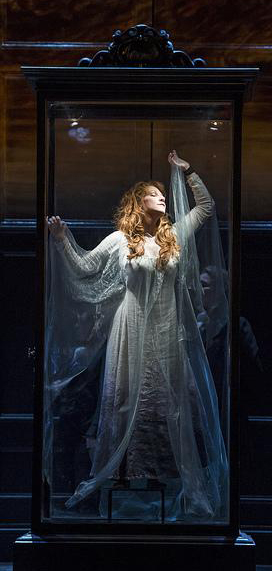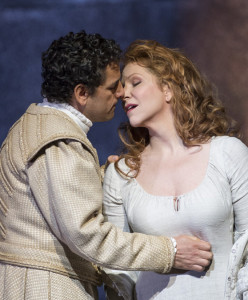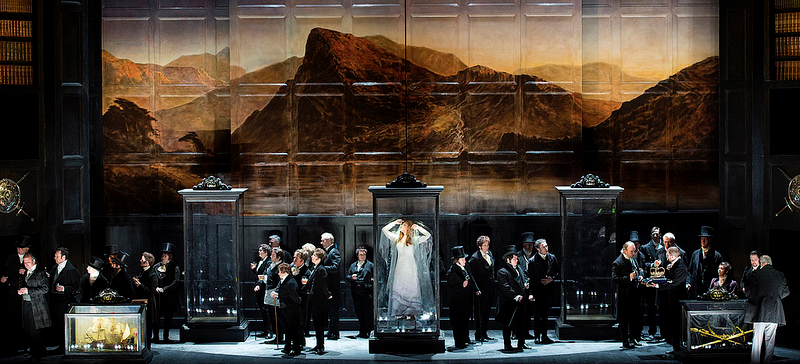La Donna del Lago, Royal Opera House
“As for DiDonato, words fail. No other singer could match what this blonde bombshell from Kansas does, marrying coloratura with the serene liquidity of birdsong to an expressiveness of heart-stopping beauty. Go, listen, and marvel.” ~ Michael Church The Independent May 2013
“Can [Rossini] ever have heard – or imagined – his music better sung than it was here? The sun shines out of Joyce DiDonato’s voice, and her ravishingly beautiful Elena caps the show with a sublime account of the lilting “Tanti affetti”. […] The result was a stupendous display of belissimo canto.” ~ Rupert Christiansen The Telegraph May 2013
“Trust me: London hasn’t heard such spectacular Rossini singing in decades. Like the heroine of Rossini’s Cenerentola, another choice DiDonato role, Elena is a character who requires early sustained beauty of tone and increasing passion before letting rip with pyrotechnics in the finale. DiDonato’s technique is so flawless that she can take immense, thrilling risks. She’s supposedly a mezzo, but she does things at the soprano end of her voice that would terrify her peers. Most audaciously, in her exultant “Fra il padre”, she dropped to a pianissimo so hushed that, I swear, the entire house held its breath in wonder… before erupting at the curtain-call. Exhilarating.” ~ David Benedict Arts Desk May 2013
“You would be mad not to queue from dawn to see this show. As the fought-over Elena, Joyce DiDonato is feisty, fearless and mesmerising. Her dazzling final aria brought the house down.” ~ Richard Morrison The Times May 2013
“The overall vocal line-up must rank amongst the very best ever witnessed at Covent Garden. DiDonato performs at the height of her game with thrilling singing that demonstrates a wide range, brilliant sensitivity and dynamic variation, and an exquisite mastery of phrasing. The final scene proves the most captivating of experiences. DiDonato’s performance of ‘Tanti affetti’ is spellbinding.” ~ Sam Smith Music OMH May 2013
“The opening duet between Juan Diego Florez (as the king) and Joyce DiDonato (Elena) serves notice that we are in the presence of two supreme bel cantists who might have been made for each other, so perfectly do they meld.” ~ Michael Church The Independent May 2013
“Best of all was Joyce DiDonato, who brought to the role of Elena, the eponymous Lady of the Lake, dazzling coloratura.” ~ Barry Millington Evening Standard May 2013
“In this showpiece [Tanti Affetti]DiDonato’s incredible pianissimos had the entire House holding its breath. Her terrific coloratura seemed effortless and what trills! The pastoral beauty of her early cavatina ‘O, mattutini albori’ was simply enchanting.” ~ Mark Pullinger Opera Britannia May 2013
“Musically […] it’s superlative. DiDonato, all ecstatic coloratura and floated high notes, is mesmerising […] It’s unmissable.” ~ Tim Ashley The Guardian May 2013
“When people talk about a ‘golden age of singing’, they usually mean something that happened long ago. Not any more. When mezzo Joyce DiDonato and tenor Juan Diego Flórez – the world’s two most exciting singers of Rossini – are on stage together in the composer’s La Donna Del Lago, it is obvious: THE GOLDEN AGE IS NOW.” ~ Warwick Thompson METRO May 2013
“As the museum fixture and eponymous Lady of the Lake, Elena, Joyce DiDonato sang with the gusto and commitment audiences have come to expect from her. Rossini can often feel dramatically inept from our modern perspectives, ones that unavoidably are benchmarked with the extreme fares of Verdi and Puccini. What is striking about DiDonato is her ability to take even the most tired of operatic conventions and make them feel new: her characterization revealed a deeply loyal young woman in love caught in a—believable—however extraordinary situation. She not only makes the fantastic music come alive with ease and elegance, but breathes life into each character she inhabits. DiDonato’s “Tanti affetti,” it goes without saying, was breathtaking.” ~ Michael Migliore Musical Criticism May 2013
“What is striking about DiDonato is her ability to take even the most tired of operatic conventions and make them feel new: her characterization revealed a deeply loyal young woman in love caught in a—believable—however extraordinary situation. She not only makes the fantastic music come alive with ease and elegance, but breathes life into each character she inhabits. DiDonato’s “Tanti affetti,” it goes without saying, was breathtaking.” ~ Michael Migliore Musical Criticism May 2013
“..to my ears the singing displayed here, principally by DiDonato and Florez, is one of the wonders of the current operatic world. Either together or separately, as in DiDonato’s show-stopping (and intentionally showboating) final aria “Tanti affetti”, both leads breathe miraculous life into Rossini’s trademark runs, roulades and ricocheting high Cs and Ds.” ~ Guy Dammann Independent on Sunday May 2013
“I imagine that Rossini would have been delighted with the casting: I can’t recall hearing so much dazzling vocal virtuosity on this stage.
As Elena, Joyce DiDonato swept all before her. Her voice fits the size of the theater perfectly and her technique is second to none, both in cantilena and coloratura: it’s not just a case of vocal accuracy, but also the ability to inhabit the music and make something living and vibrant […] Her final rondo brought the house down.” ~ Francis Muzzu Opera Now July/August 2013
“[…] it was Joyce DiDonato herself as Elena who became Queen of the opera. In describing her voice and her employment of it, it is difficult to even know where to start. […] her voice became its own entity, rising above every other single element of this production, including, one might say, Rossini at his not-so-very-much best. Her voice soared over the house and created an effect that can rarely be produced at a single singer at any one time. When it comes to listening to her instrument, sometimes it isn’t even necessary to listen to a phrase or whole aria; sometimes a single note that exudes from her is in itself a thing of beauty. Every note is perfectly controlled; never shaky, never apt to slide up or down. The notes in her coloratura patterns, although they are so fast and racy, were each of them as distinct as church bells. Any spectator could hear one of them apart from the others at a distance of thirty miles off. The timbre itself is so variable and multi-faceted – ranging from the grizzle, rumbling effect at the bottom to the silvery, metallic, flute-like level at the top – that in its potency that voice could puncture holes. The truth is that while opera demands artistic excellence, DiDonato could have sung the whole role coldly and impassively and still have been impressive.” ~ Sophie Lambton Musical Opinion July / August 2013


